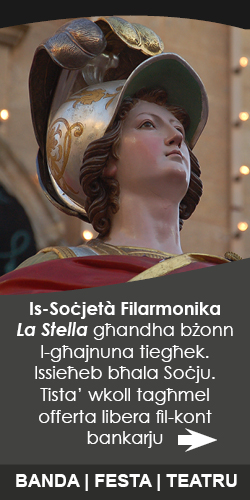“TAKE YOUR SEATS”
Il-ħarġa t’Ottubru 2007 tal-magazine LET’S GOZO tagħti ħarsa lejn il-ftuħ ta’ l-istaġun operistiku fil-gżira Għawdxija – li jiġbed numru kbir ta’ Maltin u turisti lejn gżiritna bejn Ottubru u Novembru.
L-artiklu miktub minn Sandra Aquilina, jagħti ħarsa lejn iż-żewġ opri li ser jittelgħu f’dan ix-xahar fiż-żewġ teatri ta’ beltna, iżda kif wieħed jista’ jara sew, ngħatat prominenza lejn l-opra “Macbeth” li ser tittella’ mill-ġdid fit-teatru Astra wara għaxar snin – għaxar snin mid-debutt tat-tenur Malti ta’ fama mondjali Joseph Calleja, proprju ġewwa t-teatru tagħna. Mhux hekk biss, iżda anke fil-faċċata ta’ dan il-magazine, il-bord editorjali għoġbu jġib ritratt kbir b’dehra mill-isbaħ tat-Teatru Astra. Għall-benefiċċju ta’ dawk li ma qrawx dan l-artiklu, lastella.com.mt għażlet li tippubblikah hawn taħt:
______________________________________________________________________________________________________________
Before the saints’ statues are even safely back in their niches, Victoria’s two theatre houses are already preparing to outdo each other in the sheer spectacle of their operas. The resulting high-calibre performances give patrons plenty to sing about, says Sandra Aquilina
Barely has the festa fervour died out and the statues of the saints been safely returned to their niches that Victoria is not already preparing for another convulsion in its busy cultural life. The opera season is looming close and, with it, the capital’s two opera houses are expected to – once again – attempt to outdo each other in grandeur, talent and sheer spectacle.
This is good news for the rest of us, of course. For how else would Gozitan and Maltese patrons be treated to two international calibre productions within the same month – and within the same street? True, it might be argued that, with a population of circa 7,500, Victoria does not really need two opera houses – both of which tend to make the Manoel Theatre look like their little sister – at least in terms of sheer size. But then one should never complain for having too much of a good thing.
This year’s operas, in fact, seem attempting to outdo not just each other – but also their own glorious pasts. The season will start off with Giuseppe Verdi’s La Forza del Destino which will be staged on 13 October at the Leone Philharmonic’s Society Teatru ta’ l-Opra Aurora. The cast will be composed of Anda-Louise Bogza as Donna Leonora and Marzio Giosso as Don Carlo di Vargas. Don Alvaro will be played by Vladimir Kuzmenko, while Nadia Petrenko will play the role of Preziosilla. Mr Kuzmenko has played the same role in the recently launched La Forza del Destino by the San Francisco Opera in the 2005/6 season. Other soloists include Martin Gurbal, Romano Franceschetto Massimiliano Damato, Luigi Cirillo, Costantino D’Aniello and Rita Dimech. Chorus master is Mro Colin Attard, who will conduct the national orchestra, led by Marcelline Agius. Artistic direction is in the hands of Novella Tabili.
Barely two weeks later, the La Stella Philharmonic Society’s Teatru Astra will stage Verdi’s Macbeth, with the participation of world-famous Maltese tenor Joseph Calleja. Two performances will be held on Thursday 25 and Saturday 27 October respectively. Francesca Patane’ will play Lady Macbeth while Marco Chingari will take on the role of Macbeth. Artists in other leading roles include Franco de Grandis as Banquo and Joseph Aquilina as Malcolm. Other soloists are Kevin Caruana, Dorienne Portelli and Bernard Busuttil. Artistic direction is in the hands of Mario Corradi, while Mro Prof Joseph Vella will conduct the national orchestra, led by Marcelline Agius. The Teatru Astra Opera Chorus (Chorus Mistress: Maria Frendo) will be in attendance.
Joseph Calleja’s return to the Astra theatre is doubly significant since he will be reprising the role of Macduff, which he played 10 years ago at the same theatre. The performance is bound to bring back memories – the Astra was in fact the first stage on which the international Maltese tenor first performed for the public. 10 years and a chain of international successes later, he is set to return, with an exceptional cast, in an even higher level event. The calibre of the various casts is a clear indication that opera in Gozo is not a small affair. Apart from the principal cast – usually composed of international artists – all work behind the scenes and on the organizational front is carried out by Gozitans. And it is almost all done for free. Barely a few weeks after putting away the street decorations for the festas, the same society supporters are hard at work, getting ready lights, scenery and costumes. Still, both societies spend tens of thousands on their opera, aiming for the most accomplished artists to grace the stage of their theatre house. Some assistance is obtained through the Gozo Ministry and the Good Causes Fund, but the bulk comes from donations, collections and sponsors – even services in kind – which are generated by the various societies from their members and supporters. Just how seriously the opera is taken is shown by the fact that, a few years ago, a new road was built around the Aurora to help the horses on stage for the Aida, which was promptly demolished after the close of the opera season. Much of this is fuelled by a genuine love for the society and the saint whom it honours – St Mary for the Leone Philharmonic Society and St George for the La Stella. But a lot also boils down to a different sentiment altogether – a wish not to be outdone by the neighbouring society.
Rivalry between the two band clubs in fact goes further back than anyone can remember, often reaching fever pitch during the festa season. Situated on the same street, merely a few hundred metres away from each other, both societies have built magnificent theatres and large and imposing headquarters. Both have an illustrious tradition and band clubs with a prestigious history. Both celebrate glorious and popular feasts.
And yet their history is also marked with episodes of rivalry, one of the most memorable possibly being a few years ago when both announced that they would be staging Verdi’s Aida, and neither would budge. Performance dates were announced by both theatres after which the Aurora eventually moved its performance date a whole month ahead, ensuring that it would be the first to stage the opera.
Fortunately, such rivalry can also be put to good use, generating enthusiasm, says La Stella Philharmonic Society president Joseph Grech. “The true challenge that lies ahead of the two band clubs is to utilize the rivalry in a competitive – rather than a destructive – manner,” he points out.
We are sitting round a table in the large hall at the Astra headquarters, together with society treasurer Gorg Cini. Like the Aurora, the Astra is housed in an old townhouse in the capital’s main thoroughfare. I have just been to see the Astra theatre, with its beautiful gilded boxes and plush seats. The theatre was recently rebuilt after parts of it were burnt down by a fire started off by a short circuit four years ago. Not to be disheartened, the society rebuilt the theatre, adopting the services of Oscar-winning designer Peter Howitt to redesign it. The rebuilding and refurbishment cost a quarter of a million liri and the new opera house was meant to impress tourists, locals – and the Aurora.
Which of the two operas will be the better one or attract more people is hard to tell. In fact it is probably not even the point at all. One thing is certain: no one will be able to say that the two houses have not done their best to make sure that their audiences are treated to a grand spectacle, from the moment they settle in their plush seats and wait for the lights to dim and the maestro to raise his baton.



